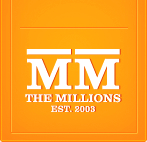 Really interesting post in The Millions about self-publishing – which to me is kind of watershed compared to yet another post about self-publishing in the Washington Post or New York Times. The Millions is an established litblog on the high-brow edge – the kind of site that might have never given self-publishing a second look 5 years ago, but now is finally seeing self-publishing as increasingly necessary for an increasing number of writers.
Really interesting post in The Millions about self-publishing – which to me is kind of watershed compared to yet another post about self-publishing in the Washington Post or New York Times. The Millions is an established litblog on the high-brow edge – the kind of site that might have never given self-publishing a second look 5 years ago, but now is finally seeing self-publishing as increasingly necessary for an increasing number of writers.
It also falls in line with the discussion we’ve been having about “indie” credibility. Self-publishing has already cemented its commercial credibility, but it has yet to seem like a truly viable outlet for the literati. Dave Eggers doesn’t count: he’s not using Createspace. His books fall into this category:
I’m just going to go ahead and say it: At this point in time, self-publishing lacks the cool factor. It’s… dorky. Go ahead, call me a snob (check), call me the mean girl (check). You can also call me someone who loves a well-made, beautifully designed book that makes me shiver with desire. To me, a good-looking book implies an understanding of the marketplace and how to maneuver within it.
See: McSweeney’s, not Lulu. She goes on:
Most (though not all) self-published novels look, well, self-published. I’ve met enough self-published authors at festivals and conferences to know most of them aren’t doing things right. Don’t wear a baggy T-shirt with the cover of your book screen-printed across the chest. Don’t wear a cape made of crushed velvet. Don’t refer to your “fiction-novel.” And don’t pay some questionable publicity company to spam staff writers of The Millions with press releases.
Yes, that’s an insulting generalization and all that, but if you’re really going to be honest: you can still spot some self-published books a mile away. The lack of professionalism with some self-published books hasn’t magically been cured now that self-publishing has gained credibility.
The success of Amanda Hocking doesn’t get writers like this excited. And before you go shouting me down as an elitist as well who doesn’t care about mainstream self-published fiction – which comprises the absolute majority of what’s self-published – you need people like this writer. Once self-publishing is “cool” to people who run online magazines like The Millions, then more self-publishers will not be turned away for reviews. Guidelines at major litblogs will no longer say: no self-published books, please. You might still be turned away for the book’s content, but not because of how it was published.
Self-publishing really does need the literary version of Amanda Hocking – a self-publishing Jonathan Franzen. When that happens, the total self-publishing revolution will begin. It’s creeping towards that and it’s totally inevitable, but there’s still a large segment of the reading public – who comprise a large percentage of influential people in publishing – who are just now thinking of self-publishing as viable.
Rob Blackwell, author of A Soul to Steal, writes this comment on the post:
Self-publishing is dorky?
So writing a novel yourself and having the guts to go out there and try and find an audience for it is somehow uncool? I think you have it backwards.
Honestly, waiting for a traditional publishing company to “bless” your work or reaffirm you — that’s dorky. You don’t need them anymore. Really.
If you have a novel, and you’ve had it edited, copyedited, revised, etc., there is no reason to wait for someone else to give you their stamp of approval. That feels lame, even “pathetic,” as Joe Konrath puts it. If you are confident in your own work, you should share it.
I published my own novel, “A Soul to Steal,” two months ago on Amazon. It’s an ebook only — I didn’t even bother with a print version. It now has 24 5-star reviews and a number of very positive reviews from book bloggers. Should I have waited until some publishing company sorted through their slush pile and decided it was worth it? Would that make me cooler? Cause right now I’m making money and gaining fans. It’s not easy, but it’s definitely cool.
Great comment, and his rank is at 7000, which is pretty great 2 months in – but that book is not going to be persuasive to the writer from The Millions. It’s genre fiction, which a self-described snob probably thumbs her nose at. But this sentence says everything: “Honestly, waiting for a traditional publishing company to “bless” your work or reaffirm you — that’s dorky.”
Fact is that literary writers might need that validation than other writers. For a book to be deemed “important,” then important people have to like it. The bestsellers of 100 years ago might be forgotten, but for something to be canonized, critics have to all come to agreement, not readers. So old failures like Moby Dick or The Great Gatsby then become part of the canon, after failing in their first run. So, really, self-publishing is a purer form of writing because writers are less concerned with being celebrated, and more concerned with being read.
Eventually, though, “serious” critics will have to get on board, because as many gems are in the mounting pile of self-published books as there are traditionally published. For a long time, it was assumed that self-published books were bad, and with some good reason. What was so stupid about the stigma was that all writers were blamed for the faults of other writers – makes no sense. But it was not seen as a club you should be proud to belong to. Not really any longer, or at least we’re heading that way. So the dorkiness of the entire publishing industry is finally coming to an end.
Update: Kristen Tsetsi has a great dissection of the Millions piece.
Get an Editorial Review | Get Amazon Sales & Reviews | Get Edited | Publish Your Book | Enter the SPR Book Awards | Other Marketing Services






















Here I was, thinking I’d pretty much decided to send out query letters to publishers about my once self-pubbed novel, and along comes this piece to mess me all up.
After releasing “Homefront,” I got reviews (good ones) from some pretty credible places I was surprised were actually willing to look at a self-pub, places whose opinions I thought would make a difference when I tried to get reviewed by even larger, “Self-Pub? Oh, gawd” places. But, nope – it turns out, it didn’t matter who liked it or where it was reviewed. It was self-published, and therefore it had not gone through the “proper” channels and wasn’t worth their time.
(I’ve heard a lot of people say reviewers can’t open themselves to self-pubs because they’ll then be flooded with all kinds of rushed material, but I firmly believe that once someone’s taken the steps that “prove” the book is at least worth a look, that should mean something.)
I pulled my book from Amazon because I thought I’d found a publisher. That fell through. Now I have this manuscript again – self-pub again, or try again for a publisher?
According to this article, self-pubs are losing their stigma, which could be good for someone trying to pitch a previously self-pubbed novel to a publisher, but the loss of that stigma also means there might be a better opportunity as a self-pub to get the book reviewed by the people who, a couple of years ago, would just as soon have kicked it into a grease puddle.
Dammit.
Glad to help! What ever did happen with PMT – is it a cautionary tale you can share?
You DIDN’T help, thank you very much.
The “fell through” part is complex and convoluted. Suffice it to say, it may go back to being “Homefront,” as much as I’ve come to not like the title.
‘So, really, self-publishing is a purer form of writing because writers are less concerned with being celebrated, and more concerned with being read.’
Actually, it may be purer because at least some self-published writers are concerned with neither being celebrated nor read; rather, with writing well.
“call me someone who loves a well-made, beautifully designed book that makes me shiver with desire.”
I dunno. When I look at my current stack of books, all I see is a Kindle.
When it comes to that kind validation, a lot of best-selling non-self-published authors have had the same problem with the high-brow literary set. No respect! Self-publishing has its King/Koontz/Clancy equivalents in Konrath/Hocking/Locke, but when are they going to get their Roth/DeLillo equivalents? It’s probably bound to happen, but it could take quite a while. The residents of ivory towers are often the last to get with any program :}
In the meantime, there are plenty of other forms of validation, from raw sales to online-ratings to Twitter-followers to Facebook-likes to Amazon rankings. The “literary establishment” might end up in some dusty old corner along with professors of Esperanto and connoisseurs of pewter flatware.
I agree with Tom. I think self publishing and promotion through social network is a real growing trend and something that will get bigger and bigger in the future. A friend of mine, Michele Gorman, despite being a best-selling writer in the UK, decided to self-publish in the US. She’s blogging about this on http://www.michelegormanwriter.blogspot.com. I think writers like this are changing the game.
I run the wishing shelf awards for independently published books and I must say the quality of many of them is excellent.